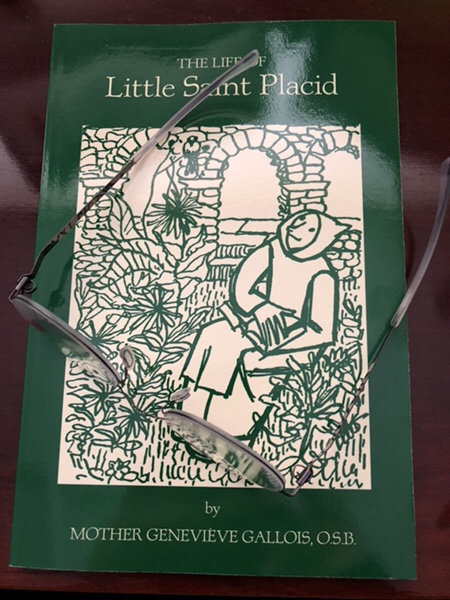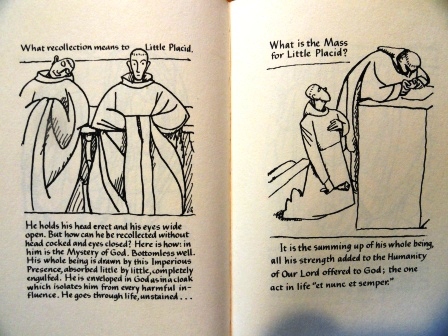 I bring to your attention today two books, which I have mentioned before, quite a while ago and recently. Book club opportunities for sure.
I bring to your attention today two books, which I have mentioned before, quite a while ago and recently. Book club opportunities for sure.
Firstly, I stayed up a good share of the night last night reading deep into an immensely deep book, the newest from Michael O’Brien.
The Sabbatical. US HERE – UK HERE
Thanks to the reader who sent it!
There are so many layers in this that I am rather gobsmacked. I long to stop to make notes – I’m reading a hardback, not Kindle – but I am restraining myself. I just decided I would at least use some little post-it arrows.
Here is a passage that particularly struck me. There is a confluence of Catholic intellectuals, gathered in a remote place, delivering papers and discussing them, the world and everything. In one address:
“Modern humanism, divorced from the Catholic sense of the imago Dei, has not given us progress in any deep abiding sense. It has given us the development of technique. It has given us the triumph of subjectivism. It has given us despiritualization, and despiritualization has in consequence given us dehumanization. Dehumanization, in turn, is now showing every sign of working out its terrible logic: In the end, unless there is a return to our true identity, the world will degenerate into the overtly diabolic, which means the absolute negation of man.”
I put down the book at few minutes ago when I found this:
“Yet salvation history is moving toward the end, the eschaton, which scriptural prophecy and the words of Christ warn will be a dire and horrible climax.”
“Yes, the ultimate conflict will come. It will come regardless of the forms of government mankind produces. Even so, a virtuous monarchy might delay the end and enable people to thrive for a time, perhaps even an extended period of time. But that is a matter for God’s will alone.”
“I’m not sure I understand your meaning, Clement. Are you saying that God might prefer mankind to fall deeper into darkness, as a way of wrapping things up, getting the business of history over and done with?”
“No, such a position would veer very close to determinism. It would also indicate ignorance about God’s nature, which is love, and his desire for the salvation of souls. Even so, he respects our freedom.”
“So you’re saying that certain souls may yet arise in the course of this dark age, using their freedom rightly and reversing the tide?”
“Reversing the tide? No, it cannot be reversed absolutely. I mean, rather, that until the final climax saints may arise and, using their freedom rightly, steer their generations toward the true light, for the good of many souls.”
“And by implication, those who govern wisely might also arise.”
“It is possible, if there is conversion of heart. Yet the heart alone is not enough. There must be radiant truth in the mind, and for this, I believe, an illumination of conscience is necessary.”
I decided to walk around for a while, and then share this.
Anyway, I am catching tendrils back into a couple of his other books, such as “Cry of Stone” and “Voyage”.
I sense I am at a turning point. O’Brien has been setting up for some crisis even that must be a kind of eucatastrophe. He has woven Tolkien’s – Inklings’ – world view in, about reality and myth and history. At moments it feels like an intersection of Mr. Chips and John Galt, with some Narnia and … not sure what next… Agatha Christe, thrown in. I know myself, as the Greeks put it. I will finish this book before sundown. I may start reading again for the sake of marking passages. The “Easter Eggs” jump out, but I’m reading without stopping so as to get the whole flow, which I sense is equally important. They will still be there, probably multiplied, after I’ve finished for the first time.
Next, today is the Feast of St. Placid, a disciple of St. Benedict. If you do not know the superb little book, now reprinted in English thanks to a long-time reader here, you are in for a treat.
Thank you St. Augustine Academy Press. Also a monthly donor here. (Are you?)
I discovered this little book during a retreat I made at a pretty much dying convent’s library.
The book is called La vie de petit st Placid… The Life of Little St. Placid by Mother Geneviève Gallois. I have it in the French original and in both the older and new English editions.

A sister name Placida came to Mother Geneviève and asked her to draw her a picture. Mother drew 104 and thus the book was born. It is a work of deep spiritual value and nearly painful charm.

Mother Genevieve, who had come from an extremely anti-clerical background, was a talented painter. She had bad health and a hard time when at 23 she entered the convent of the Les Bénédictines de la rue Monsieur (20 rue Monsieur in the 7e arrondissement). She wound up being a novice for 22 year, in fact.
A couple more images from the book.

About Mass. Click to enlarge.




































Own the St Placid book, thanks to your recommendation in past. A favorite page from it:
How Little Placid accepts life’s rainy days.
It rains, it rains, shepherdess,
Your sheep’s wool will uncurl….
Yes, but Little Placid has nothing
to uncurl, – he’s shorn.
Thanks for the recommendations, Father! They sound like ideas for my Christmas list. My mom will be so pleased. :)
I was put off from Michael O’Brien ages and ages ago by reading a column by him in which his conclusion would have implied that Tolkien was a wrong about literature and stories. Yes, I mean J.R.R. Tolkien – the best English writer of the 20th century. So, I concluded that O’Brien must be out to lunch, didn’t know what he was talking about. But since then many good people have said he is a great writer, so I am willing to give him a try. (Maybe his fiction is better than his commentary?) But, which book is the right one to START with?
[Tolkien is central to this new book.]
On the first dog-eared page in my copy of The Sabbatical is the following: “… I think you’re saying, Matei, that regardless of our conditioning and the causality that creates our times, grace frees us to become capable of moral choices.”
TonyO,
I will suggest Father Elijah as a good first read. It is more “novelish”
than some of his other works and a good example of his style.
Please congratulate me- after fifty years of attempts, I finally managed to
read all of TLoR this summer. The right book for the right time, I suppose…
TonyO—I am currently re-reading the Father Elijah book and recommend it highly, even as your first. The Catholics who likewise endorse this as a masterpiece are listed on the back cover. I was inspired by Fr. Z, who posted about a month ago on this. Then I had just finished The Father’s Tale, which comes before The Sabbatical. But hey, even at 1,000 plus pages sprawling across Canada, Oxford, manhunts and torture across Siberia, and China…it was totally worth it. Read those perhaps first and then worry about starting the series of Strangers and Sojourners, Sophia House, etc.
I would only add the classic dystopian novel Lord of the World by Monsignor Robert Hughes Benson. Since it was written in 1907, Michael O’Brien owes a lot to him.
But they’re all good. And thanks to Father for getting us on this bandwagon again.
His last book was, I think,
The Lighthouse.
US HERE – UK HERE
TonyO: Father Elijah is O’Brien’s first published novel and a good place to start- concurring with adriennep and Skeinster (congratulations on reading Lord of the Rings). You might want to then read the sequel written some twenty years later, Elijah in Jerusalem (short, about 280 pages).
VForr: O’Brien novels are great Christmas gifts. (Though The Father’s Tale at 1100 pages might not work as a stocking stuffer.)
“Even so, a virtuous monarchy might delay the end and enable people to thrive for a time, perhaps even an extended period of time.”
Interesting, perhaps this character in O’Brien’s novel is alluding to the “Great French Monarch.”
The catch with a virtuous monarch, other than autocracy and their often problematic heirs, is that they can simply go off the rails with self-indulgence and personality cult. King Solomon went from Wise King Solomon to a king with a high place to Chemosh and a harem of Ammonite and Moabite maidens. King Henry VIII of Merrye Olde Englande was Defender of the Faith before he changed his mind and sacked monasteries. Peter the Great of Russia had his merits, but also serious flaws (Robert Massie’s biography is a good introduction). Blessed Karl’s merits and serious post-WW I blunder was discussed here in an August 19 post.
1 Samuel 8
Reading Father Elijah was a critical pivot point in my return to the Church.
About the monarchy issue, it would probably be a good idea to read the book so that more of what O’Brien thinks about it comes forth.
My comment above is not a comment on Michael O’Brien’s views, rather the comment is thoughts on what the character in the novel expressed. I’m on a business trip with others, a hard copy of The Sabbatical is inbound via a friend joining us from the States, and in the meantime the character’s remarks have got us discussing monarchy, the “Social Kingship of Christ” and the problematic Integralism (also known by its latest marketing brand: “Common-Good Constitutionalism”).
The following excerpt from the scene posted above particularly applies to those Integralists who tend to be professors, journalists, and relatively new converts who are unable to control their zeal for the faith, which is one thing, but also lust after political power in order to coerce others, violently if necessary, into obeying their disordered beliefs, which is a different matter altogether. Those disordered beliefs tend to be merely the political program of a new, man-made and un-Christian political religion.
“It has given us the development of technique. It has given us the triumph of subjectivism. It has given us despiritualization, and despiritualization has in consequence given us dehumanization.”
Another helpful quote from the scene posted above:
“And by implication, those who govern wisely might also arise.”
“It is possible, if there is conversion of heart. Yet the heart alone is not enough. There must be radiant truth in the mind, and for this, I believe, an illumination of conscience is necessary.”
I have all of Michael OBrien’s books and consider him one ofthe gretest Catholic writers ever. I have read A Father’s Tale at least five times. I
Have a pb of Eclipse of the Sun if you dont have it,Fr Z. Naturally. Ive read all of Tolkiens books many times but for sheer understanding and love of our faith there is no one like Obrien. I would recommend starting with Eclipse of the Sun if you love adventure and mystery ;0)
Thanks to Skeinster and all you others for your suggestions. And congratulations to Skeinster on finishing LoTR.
I sympathize with Semper Gumby’s caution about “problematic” Integralism, though I suspect neither Integralists nor “common-good constitutionalists” think those two idea groups have even nearly a complete overlap – my sense is that they are noticeably divergent on several fronts. That aside, one can easily suggest that for every pretty good monarch it is relatively easy to list 10 or 20 bad to horrific ones. But that fact is not special to monarchs, it applies to other top-of-the-heap authorities, whether they be presidents, premiers, prime ministers, etc.
Father,
Where can I buy the original French edition of la petite vie de Saint Placid and other of her books?
Thanks!
xavier
Semper Gumby says: an illumination of conscience is necessary.”
This was the line that made me put my book down and walk around.
In the couple of days before I read that, Garabandal and a couple of other sources talking about illumination of conscience came into my radar, particularly in relation to the issue of the katechon stopping the “restraint” soon.
And then today this came to my email:
Gorgeous drawings.
TonyO: “…though I suspect neither Integralists nor “common-good constitutionalists” think those two idea groups have even nearly a complete overlap – my sense is that they are noticeably divergent on several fronts.”
Concur. Some Integralists are Monarchists. Some Integralists, such as Adrian Vermeule, are “Common-Good Constitutionalists.” A rough analogy is the socialist revolutionaries in pre-WW I Russia. Lenin’s Bolsheviks organized as a small cadre of full-time revolutionaries with a large group of followers. The Mensheviks, including Trotsky, sought widespread party membership. Lenin’s Bolsheviks won out, Trotsky switched to the Bolsheviks, and in 1917 they siezed power from Kerensky’s government in a coup erroneously termed a revolution. (Stalin, Lenin’s heir, dispatched an assassin to Mexico City in 1940 to plunge an iceaxe into the now-exiled Trotsky’s skull.)
Integralists, whatever the stripe, share papalotry, a quest for the Strong Man, and anti-Americanism (America and its citizens are merely the target of their disordered ambitions).
Vermeule, a law professor and Catholic convert a few years ago, is an acolyte of National Socialist legal theorist Carl Schmitt. Vermeule is: pro-secret agreement between the Chinese Communist Party and the Vatican that permits persecution of Chinese Christians, pro-world government, and pro-Biden vaccine mandate. Last year he wrote in the Atlantic: “…as the law teaches, habituates, and re-forms them. Subjects will come to thank the ruler whose legal strictures, possibly experienced at first as coercive, encourage subjects to form more authentic desires for the individual and common goods.”
Journalist and Catholic convert a few years ago Sohrab Ahmari stated Vermeule is “brilliant,” and refers to his critics as “obsessives” and “fetishists,” at times commanding them, “Silence!” In turn, theologian CC Pecknold bizarrely praises Ahmari, “American conservatism has found its conscience and courage in much of your work.”
These gentlemen are reminded that Christianity is the Great Commission, not the great guillotine. And Conservatism conserves the Good, the True and the Beautiful, not a mutual admiration society.
Integralists, despite their appeals to papal encyclicals and Greek philosophy, are concocting a new political-religion. It’s political theater, resembling 19th century bombastic German opera chock full of Sturm und Drang and festooned with Christian symbolism. In the murky woods of Integralism it’s anyone’s guess at the moment who is the wild-eyed composer scoring thundering drums and screeching violins, the wild-haired librettist scribbling about cauldrons and Untermenschen, and the wild man on the stage beneath a Viking helmet “howling gigantic curses at mankind.”
TonyO makes a good point about “other authorities” and Fr. Z provides an interesting video, more later. Cheers.
I’m waiting for my copy of The Sabbatical to be delivered. When I bought it I also bought The Father’s Tale, but I had to get a kindle version as the proper books available were only second hand and hugely expensive! The first O’Brien book I read was Father Elijah and I would say that was a good one to start with. I must say that I’ve lost count of the number of times I’ve read TLOTR. Its my go to book when things get really tough. As an aside my grandmother was a friend of the priest at the Birmingham Oratory who was Tolkien’s guardian. I’ve often wondered if he ever asked her advice about his charge as she seemed to be someone that many priests approached for advice. I remember when I was a child (she lived with us) she often received letters from her priest friends and my mother used to say they asked her advice. It would have been fascinating to read some of them I think but she destroyed them all before she died.
Vermeule wrote in the Atlantic last year:
“Just authority in rulers can be exercised for the good of subjects, if necessary even against the subjects’ own perceptions of what is best for them…”
The age-old temptation to control and terrorize others. The Strong Man, the Ubermensch, the “Elite” forcing their Will on the peasants, the Other, the Scapegoat, the Untermenschen. This is the same old political-religion anti-Gospel of the bloody 20th century. It’s understandable that the volatile Ahmari would fall for this pernicious gnosticism, but Pecknold, who knows something about St. Augustine and the City of God, really should know better. But, power and fame are a powerful narcotic.
The Vermeule quote mentioned above:
“…as the law teaches, habituates, and re-forms them. Subjects will come to thank the ruler whose legal strictures, possibly experienced at first as coercive, encourage subjects to form more authentic desires for the individual and common goods.”
There is no mention, not a hint, not a trace, of God, sanctifying grace, freewill, or the virtues.
“Common-good Constitutionalism,” though tarted up with Christian symbolism instead of hammers-and-sickles and swastikas, is anti-Christian. It is not “conservative,” it is not “traditional,” it is revolutionary socialism- a wolf in sheep’s clothing.
Alexander Solzhenitsyn, 1983, Men Have Forgotten God:
“And if I were called upon to identify briefly the principal trait of the entire twentieth century, here too, I would be unable to find anything more precise and pithy than to repeat once again: Men have forgotten God. The failings of human consciousness, deprived of its divine dimension, have been a determining factor in all the major crimes of this century.”
Vermeule, Ahmari and Pecknold: Do the reading.
The “common-good” phrase is the worst. I cannot stand that hallow, empty catch-all “reason”. It’s often used to push whatever agenda down the throats of the masses all in the name of “the common good”. It’s PC culture invading the Christian realm. Unless God has commanded it, I’m cautious when I hear something needs to be done “for the common good”. First, I look at who is ordering such things, what kind of man he is, and then I try to see if there’s a hidden agenda behind the “common good” push. The man may be good, but he can be fooled. Usually there is some hidden agenda.
TonyO is correct, there are bad to horrific presidents, premiers, prime ministers and monarchs. The ratio he mentions regarding monarchs sounds reasonable: too few of Hezekiah, Charlemagne and Louis IX, far too many thugs, degenerates, malcontents and tyrants.
Generally, monarchs demand: ambassadors to report directly to them, nobility to command armies and navies, taxes and war to be the monarch’s sole decision, their kingdom transferred as personal property to an heir. Then there are dukes and barons: aristocratic privilege interfered with both justice and administration, while some aristocratic customs (such as “prima nocte”- though there is disagreement whether this was ever widely practiced) were seriously disordered.
Feudalism developed from the particularly dire conditions after the Roman Empire’s collapse. Socialism is an artificial and forced utopian project. And yet, today’s monarchists and socialists have more in common than their proponents will admit.
True, there are serious problems today with deranged tech company managers, social justice warriors wearing the rank of general and admiral, activist judges, feckless GOP politicians and Death Party politicians. But returning to a monarchy- enshrining rather than resisting today’s aristocrat wannabes- in the expectation of a long series of faithful and competent monarchs defies the historical record and a basic knowledge of human behavior. Returning to a monarchy results in a monarch placing his own “deep state” into government, and, eventually, a repeat of the Magna Carta and the Declaration of Independence.
That said, the character above in The Sabbatical does point out:
“Yes, the ultimate conflict will come. It will come regardless of the forms of government mankind produces.”
An excellent point. Until then, the effort to achieve rightly ordered liberty, to acknowledge both rights and responsibilities, to guard liberty vigilantly while avoiding a police state, to raise and educate from juvenile self-centeredness to virtuous citizenship, to show fellow citizens A Better Way without burning them at the stake for purchasing a Slim Jim and a diet Big Gulp at the KwikMart on a Sunday, to learn to ponder the stars in the sky and the depths of the oceans rather than the grotesques of “reality” TV, to live for God and Country rather than going tribal as an anarcho-syndicalist commune or as an autonomous collective deriving its authority from cannabis or as a CHAZ, well, that effort, known as the Great Commission, continues.
prayfatima: Great comment.
The “common good” phrase can be used in thoughtful discourse. It can also be used as a slogan for an authoritarian or even totalitarian political agenda, or to buttress an eccentric theology, or to combine the two in a “political religion.”
Michael Novak:
“Catholic writers, one will find, not only frequently disagree about the meaning of the term [common good] but make significant errors in discussing it…”
Novak suggests:
“…include within the definition of the common good the securing of human rights: that is, the rights of free persons and free associations.”
Properly understood, the common good has one goal: human flourishing. God created human beings with intellect and free will. Government can assist citizens via reasonable legislation with choosing the good and living virtuous lives.
But, one size does not fit all. Ordered liberty will always involve some turmoil and some chaos. We have seen the bloody and soul-crushing consequences of regimes forcing their citizens to behave and think alike. There are plenty of moments when government should simply leave citizens alone (thus, the First and Second Amendments). Self-restraint on the part of politicians does not come easy these days.
Nor does self-restraint come easily to aspiring political personalities. Those Catholics who view the “common good” as a license to authoritarianism and totalitarianism tend to blame “liberalism” for society’s ills, but those zealots actually have a problem with “liberty.” Furthermore, motivated by personal ambition and a lust for power, these zealots ignore subsidiarity (an actual Catholic political principle supporting local and small government) and instead pursue the socialist path of centralized government control. We know the consequences of revolutionary and utopian projects designed to engineer human behavior.
The common good and “Gaudium et Spes”:
“The common good embraces the sum of those conditions of the social life whereby men, families and associations more adequately and readily may attain their own perfection.”
The virtues cannot be legislated (but government can certainly assist here). The virtues must be freely chosen and patiently cultivated. Eternal Life must be freely chosen, salvation cannot be forced by man-made schemes.
“I am the way, and the truth, and the life; no one comes to the Father but by me.” – John 14:6
Political slogans need not be deceptive or hollow, but some are. Political philosophies need not be sinister or stupid, but some are.
“Beware lest any man cheat you by philosophy, and vain deceit; according to the tradition of men, according to the elements of the world, and not according to Christ.” – Colossians 2:8
prayfatima wrote:
“I’m cautious when I hear something needs to be done “for the common good”. First, I look at who is ordering such things, what kind of man he is, and then I try to see if there’s a hidden agenda behind the “common good” push. The man may be good, but he can be fooled.”
An excellent point.
Edmund Burke, reflecting on the French Revolution which cried “Liberty, Equality, Fraternity” but produced the guillotine:
“The wild gas, the fixed air, is plainly broke loose; but we ought to suspend our judgment until the first effervescence is a little subsided, till the liquor is cleared, and until we see something deeper than the agitation of a troubled and frothy surface. I must be tolerably sure, before I venture publicly to congratulate men upon a blessing, that they have really received one.”
A current illustration. Several days ago Palladium magazine published an article profiling Chinese government official Wang Huning. Some Integralists, whether monarchists or “common-good constitutionalists” happily circulated the article (including CC Pecknold, a theology professor at CUA) simply because it reinforced their anti-Americanism and complaints about “liberalism.” The Integralists, after their initial excitement wore off, should have taken a closer look before spreading Communist propaganda.
From the Palladium article:
“[According to Wang], America’s problems are in fact all inextricably interlinked and have the same root cause: a radical, nihilistic individualism at the heart of modern American liberalism.”
“the American economic system has created human loneliness”
“nihilism has become the American way”
Of course Wang would say that, he is an anti-American Communist, in fact, a member of the Politburo in Beijing. The Politburo is persecuting Chinese Christians and rewriting the Bible (e.g. Jesus stones to death the adulterous woman- the attraction of such a scene to both Communists and most Integralists is obvious).
Integralists also approved of this:
“Profoundly curious about America, Wang took full advantage, wandering about the country like a sort of latter-day Chinese Alexis de Tocqueville, visiting more than 30 cities and nearly 20 universities.”
However, Tocqueville was a friend of America who traveled the U.S. in the 19th century to both praise and constructively criticize. Wang, who wrote of his opinion of the U.S. in 1991, is not a modern Tocqueville. Wang is another Sayyid Qutb.
Qutb, a member of the Muslim Brotherhood, traveled and studied in the U.S. around 1950. He returned to Egypt and wrote how he was disgusted and offended by: Americans watereing their lawns, eating watermelon, men and women dancing together, drinking tea without sugar, sports…the list is much longer. Qutb’s deranged hatred influences Islamist terrorists to this day.
Integralists are reminded that Chinese Communists produced the Cultural Revolution with tens of millions dead, struggle sessions, the Tiananmen Square Massacre, the persecution and perhaps genocide of Uighurs, social credit scores, the secret Communist-Vatican deal that intensified persecution of Chinese Christians (which papalotrous Integralists support or remain silent), and the Wuhan Virus.
Integralists, who are known for their occasional emotional frenzies and tyrannical theocratic politics are reminded, not of the ChiCom bible, but the Holy Bible:
“But seek the welfare of the city where I have sent you into exile, and pray to the Lord on its behalf, for in its welfare you will find your welfare.” – Jeremiah 29:7
Edmund Burke again:
“It is ordained in the eternal constitution of things, that men of intemperate minds cannot be free. Their passions forge their fetters.”